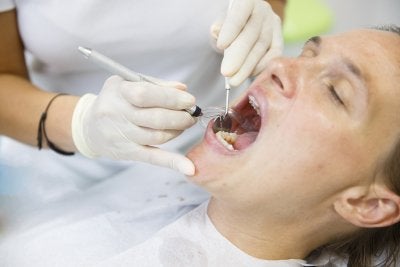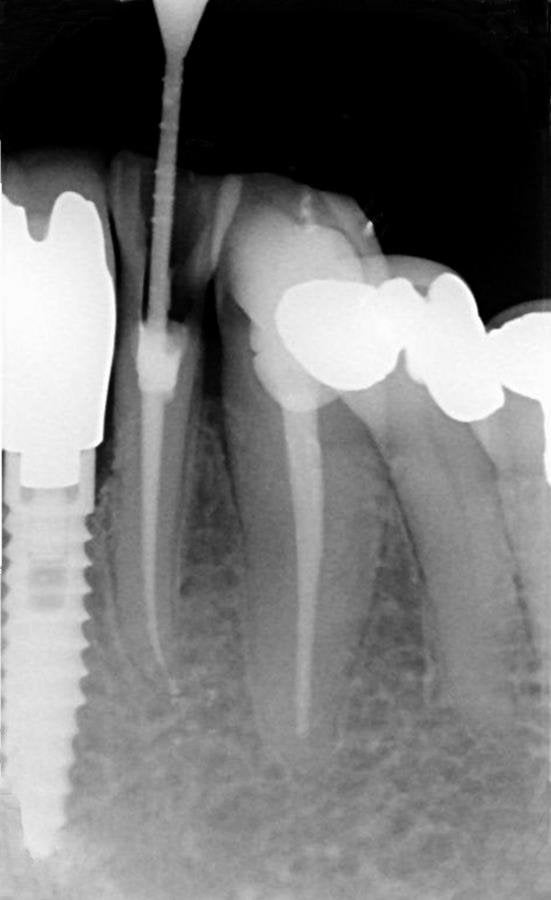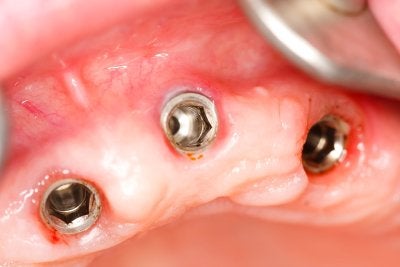-
Spotting the Signs of Gum Disease
It’s important to visit your dentist in Bel Air, MD, regularly for routine dental care, including professional dental cleanings and exams. This will give your dentist the opportunity to catch early warning signs of dental problems, such as early warning signs of gum disease . Here is a guide to spotting the signs of gum disease, so that you can quickly make an appointment at your dental clinic if necessary.

Recognizing Gingivitis, the First Stage of Gum Disease
Gingivitis is the first stage of gum disease, but its progression can be slowed or stopped with proper dental care. The warning signs of gingivitis include mild to moderate inflammation of the gums. Your gums may be red, swollen, and may bleed easily. If your dentist does not quickly treat gingivitis, it can progress to more serious stages of gum disease. Your dentist will determine the most appropriate dental care necessary for your symptoms. This may include daily brushing and flossing, using specialized prescription dental care products, and visiting your dentist regularly for dental cleanings.
More Severe Symptoms of Periodontal Disease, Also Known as Gum Disease
Without regular, daily dental care, gingivitis may progress to more serious stages of periodontal disease, which is also called gum disease. Periodontal disease causes the gums to begin to recede or pull away from the teeth. This creates pockets in the gums that can become infected with bacteria. As the infections spreads, your risk of tooth loss greatly increases. You cannot treat periodontal disease at home, but instead must visit a dentist for specialized dental care.
Signs of Advanced Periodontitis
If gum disease is untreated, it will progress to a condition known as advanced periodontitis. In this stage of gum disease, your dentist may have to perform tooth extractions to remove damaged or diseased teeth. Your tooth will then have to be replaced with a dental implant or dental bridge. Your dentist will first attempt to treat advanced periodontitis using a non-surgical dental care method known as scaling and root planing. This is basically a very intense, thorough dental cleaning during which the dentist removes plaque, tartar, bacteria, and infection from your teeth and gums. If this is ineffective, your dentist will recommend surgical dental care.
-
Missing Teeth and Your Health
If you are missing teeth due to tooth decay, trauma, or a tooth extraction near Bel Air, MD, your dentist will recommend replacing your missing teeth with prosthetics . There are a few cosmetic dentistry options for replacing missing teeth, including dentures, dental bridges, and dental implants. If you don’t seek restorative or cosmetic dental care, you may develop serious complications and health problems.
Watch this video from the American Dental Association to learn more about missing teeth and your health. If your dentist doesn’t replace your missing teeth with cosmetic dentistry restorations, you may suffer from shifting or crooked teeth, jawbone loss, facial deformity, and difficulty eating and speaking. When dentures or dental bridges are anchored to your jawbone using dental implants, you can reduce your risk of health problems. You can also restore your smile, and ensure that you can comfortably eat, speak, and maintain your dental care routine.
-
Save Your Tooth with a Root Canal
If you have a severely infected tooth, you may need to visit an emergency dentist in Bel Air, MD. An emergency dentist can attempt to save your tooth via a root canal procedure , rather than resorting to a tooth extraction. Root canal procedures are a safe, effective method of emergency dental care, and can prevent your infection from spreading while preserving the integrity of your infected tooth.
Prior to your root canal, your dentist will administer anesthesia. He may also give you a mild sedative to help you relax during the procedure. This will ensure that you remain comfortable and pain free throughout your dental care procedure. Once the anesthesia is in effect, your dentist will drill a small access hole into your infected tooth. He will use special dental tools to remove diseased or infected dental pulp, tooth nerve, and tissue from your tooth.
He will then fill the tooth cavity with medication to completely eradicate your infection. Then, he will seal the access hole with dental putty to prevent bacteria from entering. He may place a dental crown on the tooth to preserve its structural integrity and prevent a broken or chipped tooth.

-
Are Dental Implants Right for You?
Your dentist may recommend that you get dental implants near Bel Air, MD if you have undergone a tooth extraction, have a severely chipped tooth, or are missing one or more teeth. Dental implants are a safe, effective cosmetic dentistry alternative to dentures and dental bridges. Here is a look at some of the reasons that you may want to discuss dental implants with your dentist.

You are missing one or more teeth.
Your dentist can replace one or more missing teeth via a relatively simple cosmetic dentistry procedure using dental implants. A dental implant is a prosthetic tooth that is attached to a titanium rod that is implanted directly into your jawbone. The prosthetic tooth can be customized to match the size, shape, and color of your remaining natural teeth. This means that it looks almost unnoticeable when you talk and smile.
You are looking for an alternative to dentures or a dental bridge
Dentures and dental bridges are other cosmetic dentistry options that can be used to repair a chipped tooth or replace missing teeth. If you are missing all of your teeth, your dentist will recommend that you receive dentures. However, if you are only missing one or two teeth, dental implants are a better cosmetic dentistry solution. Because dental implants are anchored to the jawbone, they prevent many dental problems associated with missing teeth. Dental implants will ensure that you don’t suffer from jawbone loss, shifting teeth, or facial deformity. Dentures are not anchored to the jawbone, and thus do not prevent these problems.
You are in good physical health and committed to future dental care.
Your dentist will determine if you are a good candidate for dental implants. To be a good candidate, you must be committed to maintaining your future dental care. You will need to brush, floss, and use mouthwash at home. You must also visit your dental clinic at least every six months for dental cleanings and exams. You may not be a good candidate for dental implants if you have severe bone loss or advanced gum disease, smoke regularly, or have certain existing medical conditions.
-
Proper Flossing Technique
Do you practice proper dental care in Bel Air, MD? Your dentist has probably told you that one of the most important parts of a healthy dental care routine is flossing daily. Be sure to use a proper flossing technique in order to avoid dangerous tooth decay.
Watch this video to learn the details about proper flossing technique. Wrap about 18 inches of floss between your two middle fingers. Then, gently insert the floss between your teeth, working it up and down against the surface of each tooth. Don’t forget to floss behind your back teeth, too! Ask your dentist or local dental clinic if you have any questions about flossing when you have dental work such as a dental bridge or orthodontic appliances.
-
Causes of Sensitive Teeth
Do you have sensitive teeth? You may need to make an emergency dental appointment with a dental clinic near Bel Air, MD to help find the root cause of your tooth pain. Read on to learn more about what your dentist might say is behind your current tooth sensitivity.

Tooth Sensitivity and Tooth Structure
In order to gain a better understanding of why your teeth have become sensitive, it’s important to first understand how the teeth are structured. The hard outer layer of your tooth is called tooth enamel. It protects the inside of your tooth, which mainly consists of dentin, a tissue filled with small tubes containing microscopic nerve endings. Your teeth may become sensitive when your tooth enamel is worn down, exposing the nerve-filled dentin below. This can potentially be very painful, especially when you eat foods that are hot, cold, acidic, or sticky.
Tooth Sensitivity and Dental Issues
Several different dental issues can cause your tooth enamel to become worn down and eroded. Even using a hard toothbrush during your daily dental care routine and brushing too aggressively can weaken your tooth enamel. Likewise, grinding your teeth at night can also damage tooth enamel. Ask your dentist to check for signs of grinding and excessive wear patterns on your teeth; he or she may recommend using a mouth guard at night so that the problem does not become exacerbated.
Tooth Sensitivity and Diet
If you tend to consume highly acidic foods and drinks, such as sodas and certain fruits, you may also be weakening your tooth enamel. Limit your intake of acidic foods and aim to brush after meals to get rid of leftover acid in your mouth. Finally, tooth decay, damaged fillings, and broken or chipped teeth can expose your tooth dentin—as can gum recession. Your dentist should be able to locate and repair broken dental work that may be causing your tooth sensitivity. As for gum recession, it’s important to maintain a proper daily dental hygiene routine in order to prevent additional gum recession and the pain that goes along with it.
-
Steps to Take in Preventing Gum Disease
Gum disease, also known as periodontal disease, is one of the leading causes of tooth loss in adults. Initially, periodontal disease in Bel Air can be difficult to detect until it has advanced. In the early stages of gum disease , usually referred to as gingivitis, most people may not notice any signs at all. This is why it is so important to regularly visit a dentist to monitor signs of gum disease. Luckily, gum disease is easy to prevent. Since it is caused by bacteria, it is simply a
 matter of reducing the amount of bacteria in your mouth. Keep reading for tips on gum disease prevention.
matter of reducing the amount of bacteria in your mouth. Keep reading for tips on gum disease prevention. Routinely Brush and Floss
A dental hygiene routine is key to preventing gum disease. At a minimum, you should brush your teeth twice a day and floss teeth once a day. For the best results, brush and floss after each meal. This will help eliminate food particles that can get stuck in between teeth and cause bacteria to grow. It is important to use a toothbrush with different lengths of bristles to ensure that all surface area of each tooth is reached. Using toothpaste with fluoride helps protect your mouth from gum disease. When flossing, be sure to get in between each tooth, especially the back molars. In addition to brushing and flossing, a mouthwash can help rinse away pieces of food and also freshen your breath.Regularly Visit the Dentist
No oral health care routine is complete without annual visits to the dentist. Most dentists recommend regular visits every six months. During a dental exam, a dental hygienist will perform a teeth cleaning that is able to remove plaque and tartar that you cannot clean off at home. Once plaque hardens, it forms tartar, which can lead to gum disease. Regular dental cleanings help prevent tartar buildup. A dentist will likely take x-rays to detect any abnormalities in your mouth. By regularly visiting your dentist, you can also notify them of any new pain or other problems. Early detection of problems can prevent major problems down the road and also help you avoid the need to see an emergency dentist. -
Risk Factors for Gum Disease
Everyone wants to have a beautiful smile full of healthy, white teeth. However, there’s more to oral health than just having a bright smile. In addition to visiting your dentist near Bel Air every six months, you should brush your teeth twice per day and floss on a daily basis. This combination of professional and at-home oral care will help keep tooth decay and gum disease at bay. Gum disease can be painful and damaging to your oral health, as it could lead to tooth loss if it is left to progress unchecked. Keep reading to learn about the risk factors for gum disease and what you can do lower your risk.
Age
While there are some risk factors for gum disease that you and your dentist can control, there are others that you just can’t. As you grow older, you are at a greater risk for gum disease. According to the Centers for Disease Control and Prevention, over 75 percent of people in the U.S. ages 65 and older have gum disease. Make sure that you are visiting your periodontist regularly if you have a history of or signs of gum disease.
visiting your periodontist regularly if you have a history of or signs of gum disease. Smoking
It is widely known that smoking and using other forms of tobacco is dangerous for your health, and your oral health is no exception. Smoking greatly increases your risk of periodontal disease, and using tobacco can exacerbate any gum disease that is already present. Additionally, if you continue to smoke, it will be much more difficult to treat gum disease in a successful manner.Genetics
If you have a family history of gum disease, you may be at a greater risk of developing it yourself. That’s why it’s important to discuss your medical history with your dentist, as a preventive treatment plan can help lower your risk of gum disease.Stress
Stress can take a physical toll on your body as well as mental and emotional tolls. Studies have shown that high levels of stress make it harder for your body to fight off infections, which can include periodontal disease. Work on reducing your stress levels to improve your oral health as well as your overall outlook. -
What’s in Your Toothpaste?
Do you know what you can do to prevent gum disease in Bel Air ? Visit your dentist regularly and brush your teeth twice a day. One of the best ways to prevent gum disease and other dental problems is to practice good oral hygiene that includes brushing and flossing. While it is no surprise that brushing your teeth helps prevent gum disease, you may not know what is in your toothpaste that is so important.
The most important ingredient is fluoride, a mineral that helps fight bacteria in your mouth that leads to gum disease. Watch this video for more information about all the ingredients in your toothpaste. From potassium nitrate to help protect sensitive teeth to pyrophosphates to fight tartar, toothpaste is full of active ingredients to keep your teeth healthy. Your dentist can help you learn more about toothpaste.
-
The Oral Health Risks of Tobacco Use
Using tobacco products, including cigarettes and smokeless tobacco, can severely impact your oral health. As your dentist can explain, tobacco use dries out your mouth, decreasing the natural production of saliva. Saliva acts as a cleansing agent in the mouth, removing harmful bacteria that can cause plaque, tartar, and gum disease. The next time you visit your dentist in Bel Air , ask about the dangers of tobacco use.
Watch this video to learn more about the oral health risks associated with tobacco use. In the video clip, a dentist from the American Dental Association discusses how tobacco use increases your risk of developing infections, gum disease, tooth loss, and oral cancer.
categories
- Uncategorized
- General Dentistry
- Toothache
- Emergency Dentistry
- Family Dentistry
- Receding Gums
- Cosmetic Dentistry
- Veneers
- Gum Disease
- Gingivitis
- Dental Crowns
- Orthodontics
- Dental Implants
- Root Canal
- Wisdom Teeth
- Teeth Whitening
- Your Smile
- Composite Fillings
- Lumineers
- Dentures
- Invisalign
- BrightSmile
- Dental Bridge
- Abscessed Tooth
- Sealants
